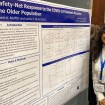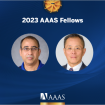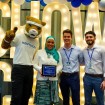UK Health Sciences Researchers, Orthopedic Surgeons Collaborate to Further ACL Injury Studies
Researchers at the University of Kentucky are working on three National Institutes of Health (NIH) grants, totaling over $8 million, to better understand one of the most common sports injuries among athletes — anterior cruciate ligament (ACL) injury.
The research team from the UK College of Health Sciences Biomotion Lab is headed by physical therapist Brian Noehren, Ph.D., professor and interim associate dean for research in the college, and Chris Fry, Ph.D., associate professor in Health Sciences' Department of Athletic Training and Clinical Nutrition. They are collaborating with Darren Johnson, M.D., chief of UK HealthCare Sports Medicine and a nationally recognized orthopedic knee surgeon, to better understand how movement and muscle dysfunction affect pain and function within injured orthopedic populations.
“Everybody in the country knows what an ACL is. It is the most commonly-injured knee ligament that we operate on,” Johnson said. “Do patients return to sport? Yes. However, I had a patient yesterday — a family with three daughters, and I did the fifth ACL reconstruction. That tells you, we don’t have it solved.”
As part of this research, Noehren’s team takes muscle samples directly from Johnson’s operating room into the lab.
“That is one of the reasons I came to UK. The Department of Orthopaedic Surgery and the College of Health Sciences are both in close proximity to each other, literally, and in terms of research missions and ideals,” Noehren said. “That is something unparalleled and it is one of the reasons we have been successful with our research and funding. We can do something that nobody else is able to do thanks to our close partnership.”
This research is helping Kentuckians across the Commonwealth.
“If you are involved in our clinical trials, you receive complimentary physical therapy, and the absolute top tier of therapy. Our clinic is custom built to provide rehabilitation for individuals who have had an ACL reconstruction,” Noehren said. “We have been able to reach out to a lot of different communities that traditionally have been disadvantaged from receiving adequate health care to bring them in and have them receive the services we provide.”
Research reported in this publication was supported by the National Institute of Arthritis and Musculoskeletal and Skin Diseases of the National Institutes of Health under Award Numbers R01AR078316, R01AR071398 and R01AR072061. The content is solely the responsibility of the authors and does not necessarily represent the official views of the National Institutes of Health


